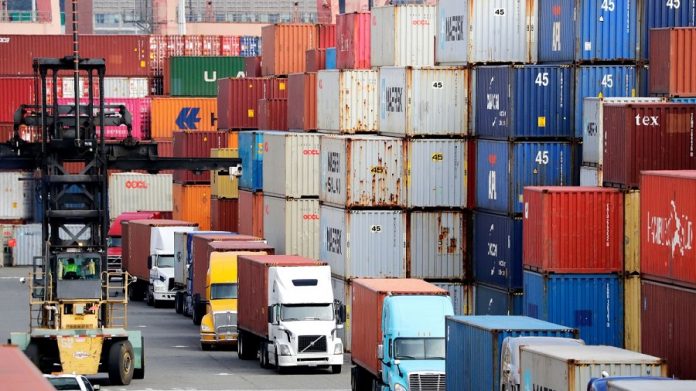The International Monetary Fund is further downgrading its outlook for the world economy, predicting that growth this year will be the weakest since the 2008 financial crisis primarily because of widening global conflicts.
The IMF’s latest World Economic Outlook foresees a slight rebound in 2020 but warns of threats ranging from heightened political tensions in the Middle East to the threat that the United States and China will fail to prevent their trade war from escalating.
The updated forecast released Tuesday was prepared for the fall meetings this week of the 189-nation IMF and its sister lending organization, the World Bank. Those meetings and a gathering Friday of finance ministers and central bankers of the world’s 20 biggest economies are expected to be dominated by efforts to de-escalate trade wars.
The new forecast predicts global growth of 3% this year, down 0.2 percentage point from its previous forecast in July and sharply below the 3.6% growth of 2018. For the United States this year, the IMF projects a modest 2.4% gain, down from 2.9% in 2018.
Next year, the fund foresees a rebound for the world economy to 3.4% growth but a further slowdown in the United States to 2.1%, far below the 3% growth the Trump administration projects.
IMF economists cautioned that that even its projected modest gains might not be realized.
“With a synchronized slowdown and uncertain recovery, there is no room for policy mistakes, and an urgent need for policymakers to cooperatively de-escalate trade and geopolitical tensions,” Gita Gopinath, the IMF’s chief economist, said in the report.
Last week, the United States and China reached a temporary cease-fire in their trade fight when President Donald Trump agreed to suspend a tariff hike on $250 billion of Chinese products that was to take effect this week. But with no formal agreement reached and many issues yet to resolved, further talks will be needed to achieve any meaningful breakthrough. The Trump administration’s threat to raise tariffs on an additional $160 billion in Chinese imports on Dec. 15 remains in effect.
The IMF’s forecast predicted that about half the increase in growth expected next year will result from recoveries in countries where economies slowed significantly this year, as in Mexico, India, Russia and Saudi Arabia.
This year’s slowdown, the IMF said, was caused largely by trade disputes, which resulted in higher tariffs being imposed on many goods. Growth in trade in the first half of this year slowed to 1%, the weakest annual pace since 2012.
The IMF projected that growth in the 19-nation euro area will slow to 1.2% this year, after a 1.9% gain in 2018. It expects the pace to recover only slightly to 1.4% next year.
Growth in Germany, Europe’s biggest economy, is expected to be a modest 0.5% this year before rising to 1.2% next year.
China’s growth is projected to dip to 6.1% this year and 5.8% next year. These would be the slowest rates since 1990, when China was hit by sanctions after the brutal crackdown on pro-democracy demonstrators in Beijing’s Tiananmen Square.
For Japan, the IMF expects growth of just 0.5% next year. It foresees an expansion in Russia of 1.9%, up from 1.1% this year.
And Mexico is forecast to experience growth of 1.3% next year, far better than the lackluster 0.4% gain envisioned for this year.
Source: time.com








































